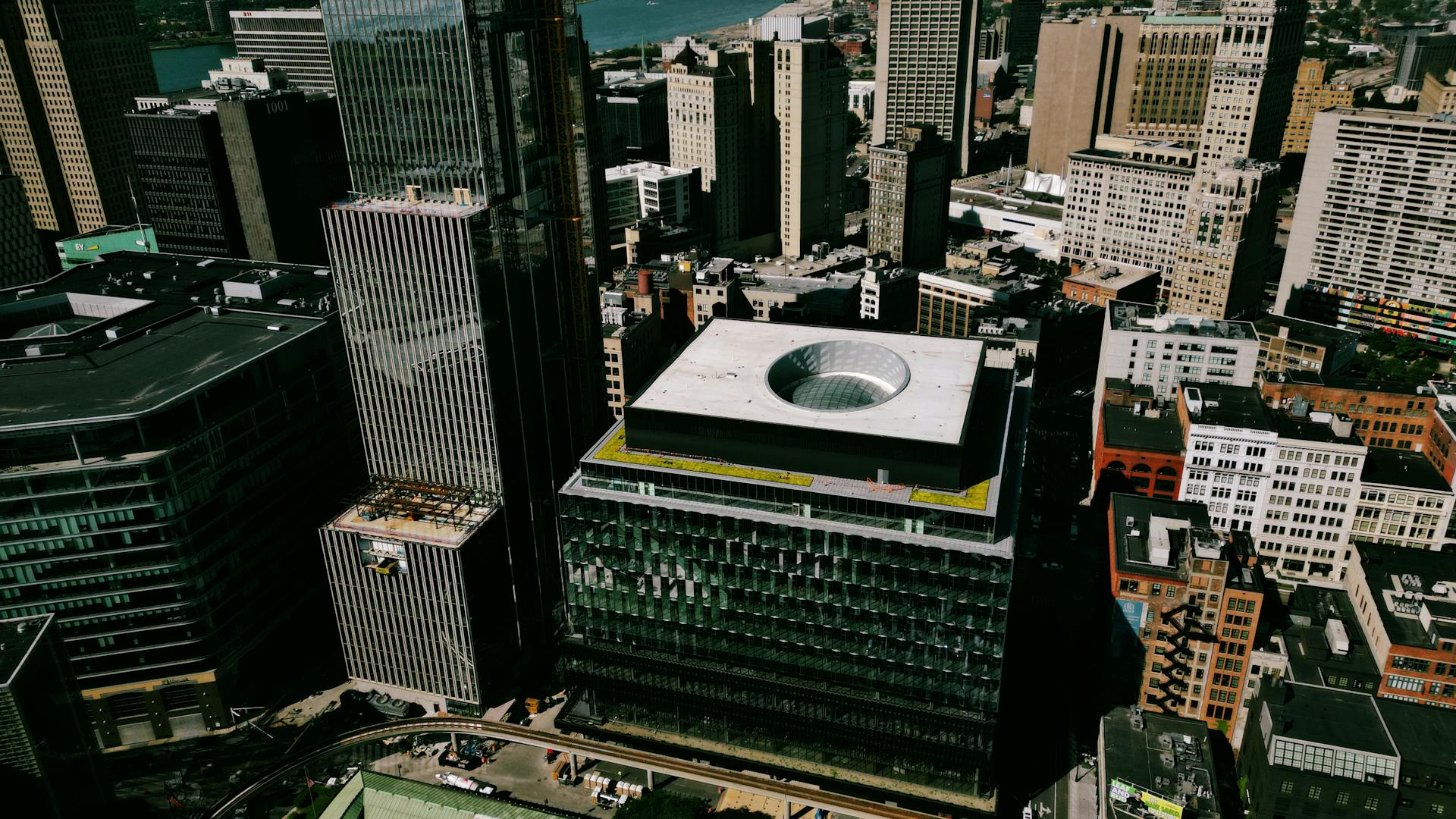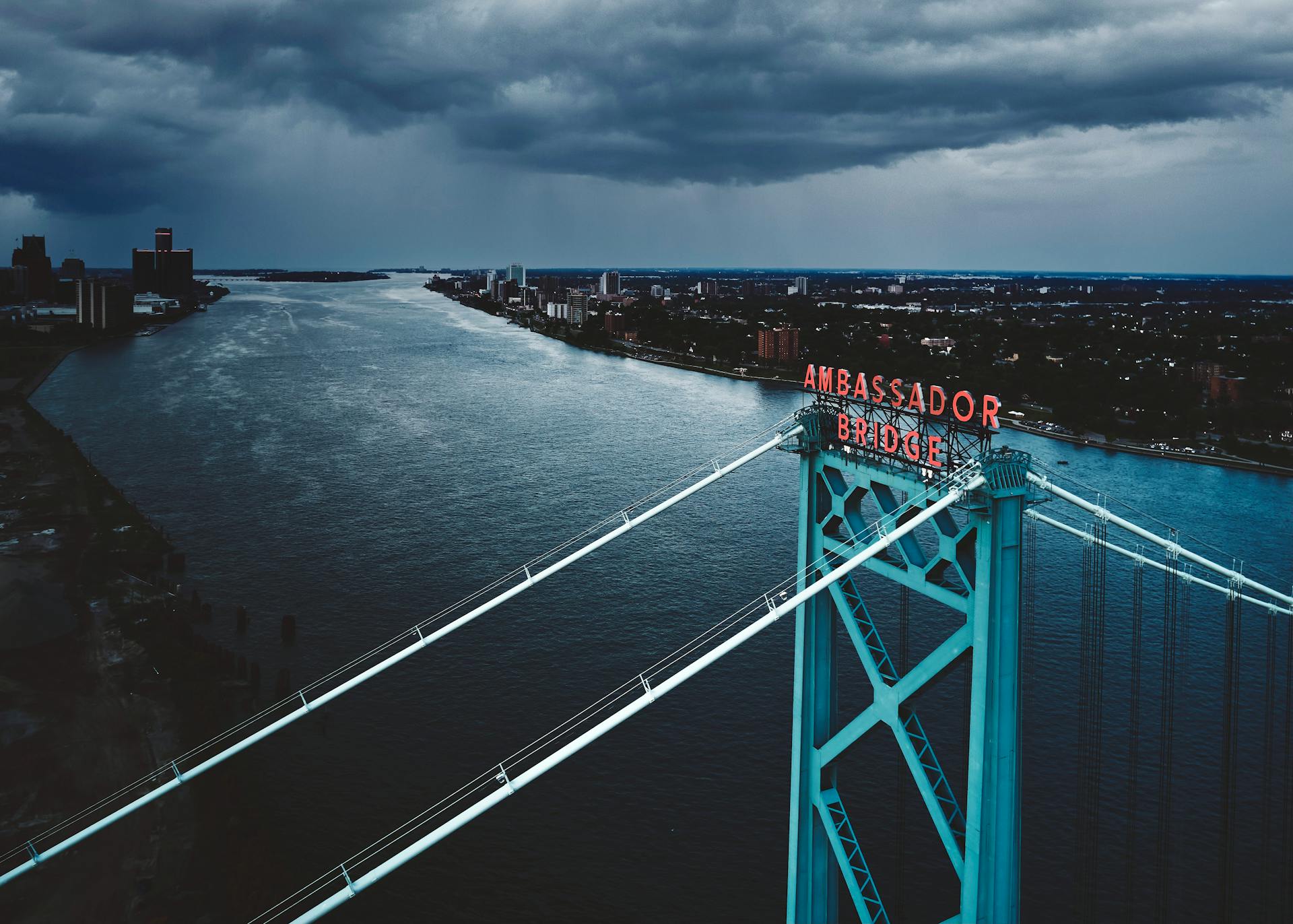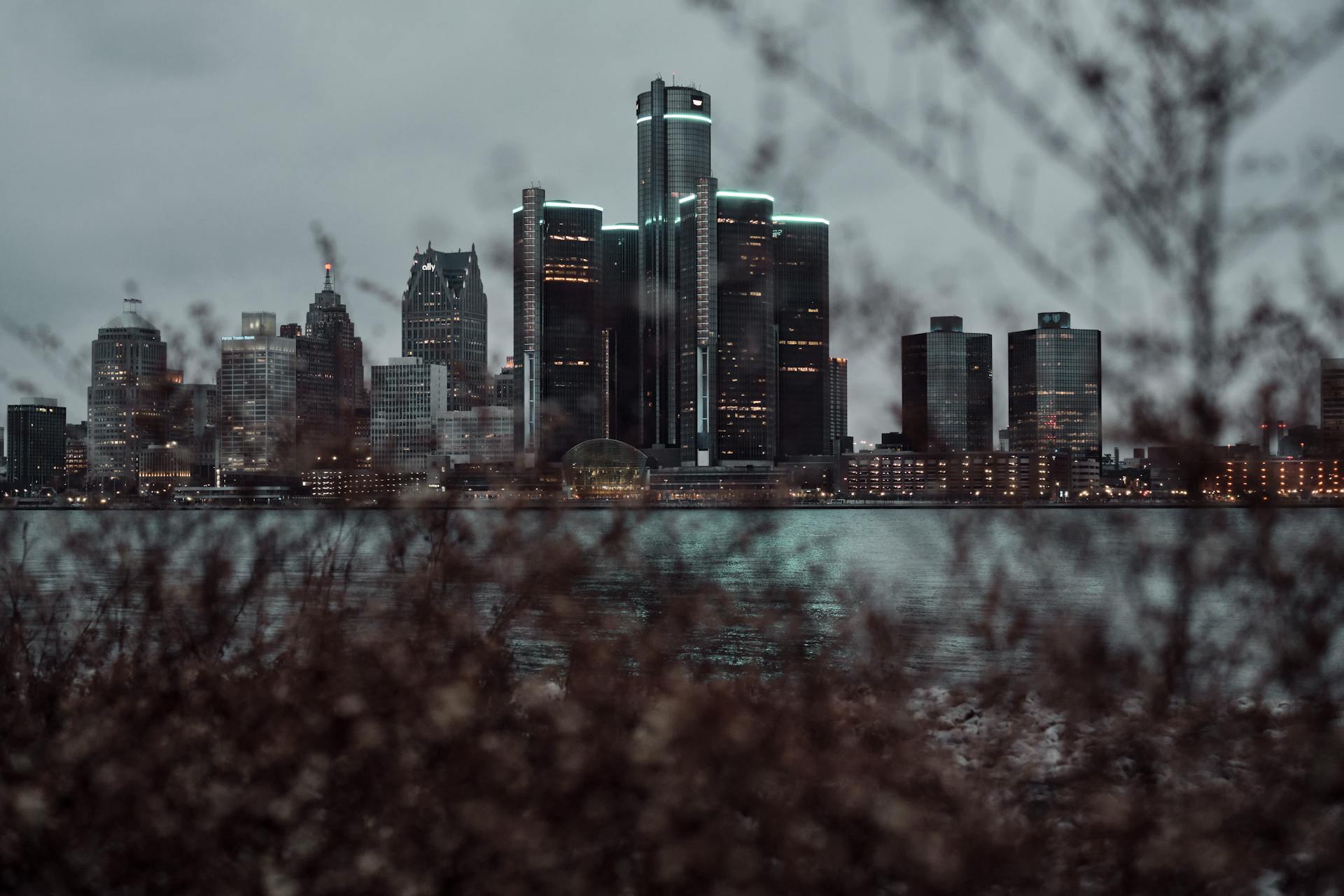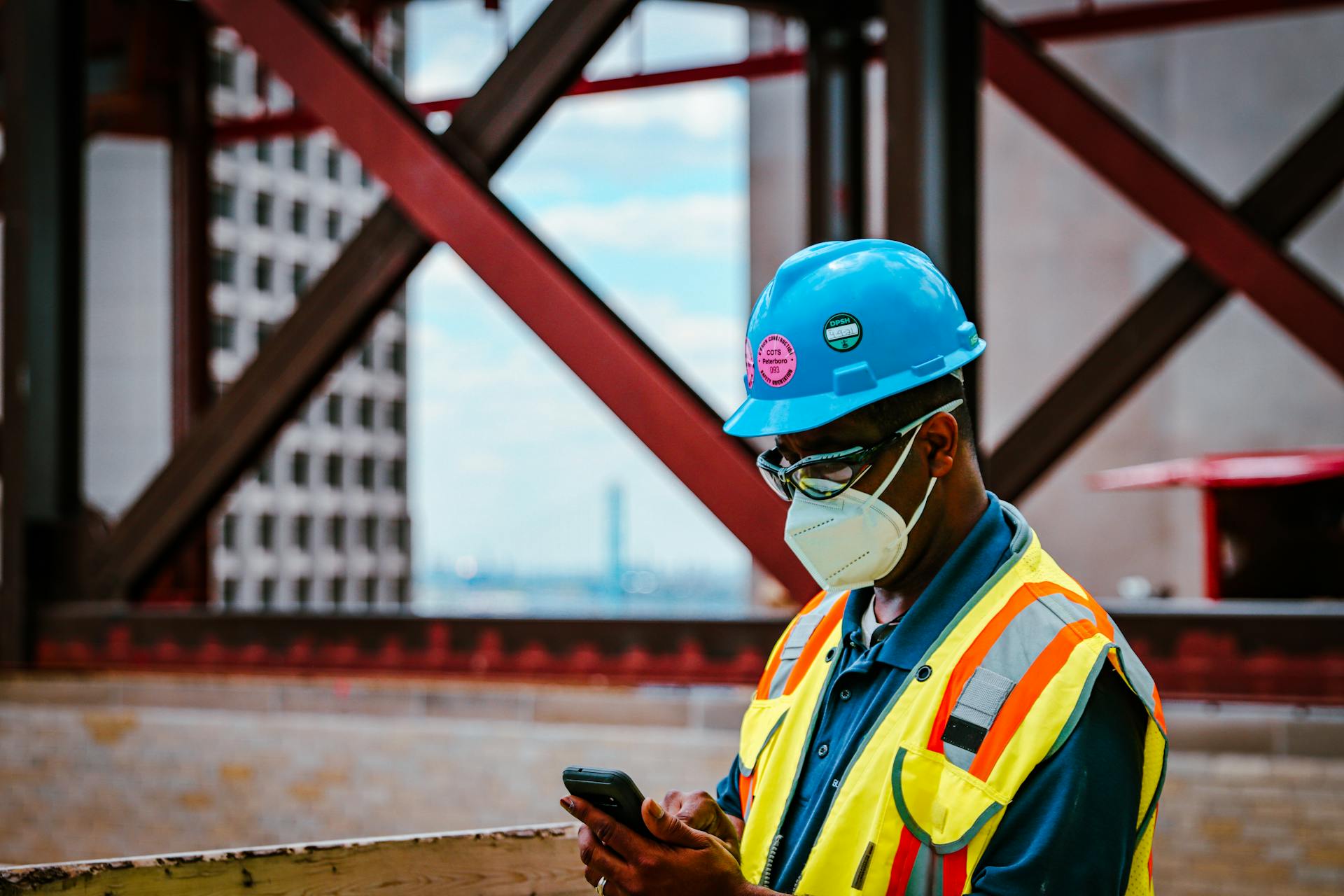
Landbank Detroit is a vital entity in the city's revitalization efforts. It was established in 2008 to acquire and redevelop vacant and abandoned properties.
The organization's main goal is to transform these properties into vibrant and sustainable communities. This is achieved through a combination of demolition, renovation, and new construction projects.
Landbank Detroit has a significant impact on the city's housing market. According to the 2020 Annual Report, it has helped to stabilize property values and increase homeownership rates in targeted neighborhoods.
The organization's efforts have also led to the creation of new community spaces and amenities, such as parks and community centers.
Recommended read: How Do I Find Bank Owned Properties for Free
The Detroit Controversies, Explained
The Detroit Land Bank has been criticized for showing favoritism and threatening to seize homes it doesn't own.
Critics argue that the organization doesn't sell properties to "regular" Detroiters, which has led to a perception that it's not working in the best interest of the community.
Some of the controversy surrounding the Land Bank stems from its decision to shift its resources to focus on high-demand neighborhoods in 2019.
This shift has led to criticism that the Land Bank is prioritizing areas that will generate more revenue, rather than addressing the needs of neighborhoods that are struggling.
The agency has also been accused of misusing its resources, such as offering nuisance abatement programs to houses that weren't purchased from the DBLA while properties currently owned by DBLA are in need of maintenance.
Council oversight is seen as a potential solution to some of the Land Bank's problems, with some arguing that it would help to increase transparency and accountability.
However, the Land Bank has argued that it would lose its "unique statutory powers" if it were rolled into a city department, which would make it less efficient.
An ombudsman has suggested that creating a city department for the Land Bank or bringing it under the control of an existing department would be a step in the right direction.
This change would allow for more oversight and transparency, which is seen as essential for improving the Land Bank's performance and increasing citizen satisfaction.
Here are some of the criticisms leveled against the Detroit Land Bank:
- Showing favoritism
- Threatening to seize homes it doesn't own
- Not selling properties to "regular" Detroiters
- Misusing its resources
Detroit Landbank News
The Detroit Land Bank is selling bundles of occupied homes, which may lead to more evictions. This is a result of a program meant to put properties back on the tax rolls.
The Detroit Land Bank's efforts to sell occupied homes can be confusing, especially for homeowners who are not aware of the process.
In some cases, homeowners may be unaware that their home is being sold by the Land Bank, which can lead to unexpected evictions.
The program is intended to help put properties back on the tax rolls, but it's clear that this approach may have unintended consequences for some residents.
Curious to learn more? Check out: Landbank Properties
Detroit Landbank Explained
The Detroit Land Bank has been a contentious issue since its creation in 2011. It's a quasi-public authority, meaning it operates like a public entity but has some private characteristics.
The Land Bank has continually faced criticism since its inception. This is not surprising given the complex and often contentious nature of land redevelopment.
The Land Bank's role is to acquire, hold, and sell vacant and abandoned properties in Detroit. This can be a crucial step in revitalizing neighborhoods and making them more attractive to residents and businesses.
What Is a Bank?
The Detroit Land Bank is a unique entity that plays a crucial role in revitalizing Detroit's neighborhoods. It was created in 2010 to streamline the management and sale of local governments' vacant properties.
The Land Bank's mission is to return the city's blighted and vacant properties to productive use. It acquires properties through various channels, including the Wayne County tax foreclosure auction.
Buildings and lots most frequently arrive at the Land Bank via the Wayne County tax foreclosure auction. The Land Bank takes control of properties that aren't bid on and is charged with maintaining, selling, or demolishing them.
The Land Bank has various channels for unloading properties, including selling homes "as is" for as little as $1,000 through online auctions or the Own It Now program. It also rehabs and sells homes for $50,000 and up.
Property owners can buy adjacent vacant lots from the Land Bank for $100. The Land Bank works with Quicken Loans to pre-approve buyers for mortgages with low down-payments.
The Land Bank's "compliance program" requires those who purchase a home to occupy the property within six months, though it grants extensions. This is designed to combat real estate speculation in Detroit.
Broaden your view: Nationstar Mortgage Foreclosure Listings
10 Things to Know About Detroit's Largest
The Detroit Land Bank is selling bundles of occupied homes, which may result in more evictions. This is a concerning issue, especially for the residents who are already struggling.
The Detroit Land Bank is a program meant to put properties back on the tax rolls, but it's not entirely clear how this will benefit the community.
In fact, the program is selling bundles of occupied homes, which could lead to a surge in evictions. This is a problem that affects many low-income families who are already facing financial difficulties.
The Detroit Land Bank has a significant impact on the city's housing market, with thousands of properties under its control. This is a staggering number, and it's clear that the Land Bank plays a crucial role in shaping Detroit's housing landscape.
The Land Bank's goal is to put properties back on the tax rolls, but it's not clear what this means for the residents who are currently living in these homes. Will they be able to stay, or will they be forced to move?
Worth a look: 1031 Improvement Exchange on Property Already Owned
Home Sales and Auctions
The Detroit Land Bank is selling bundles of occupied homes, which may lead to more evictions, as a program meant to put properties back on the tax rolls.
The Land Bank is also hosting auctions where homes can be purchased for a relatively low price. For example, a University District home recently sold for $255K, but it needs a full rehab to reach its full potential.
A Boston-Edison house set a record in the Land Bank auction by snagging a bid of $240,100, making it the highest bid ever for a Land Bank auction.
Consider reading: Bank Owned Homes Free Listings
Not Selling to Regulars
The Detroit Land Bank has faced criticism for not selling properties to regular Detroiters. This has led to skepticism about the organization's motives.
Comparisons between the numbers of properties owned by the Land Bank and those being sold have raised eyebrows. The Land Bank's programs are designed to sell as well as revitalize properties, but some community members believe city employees are being shown favoritism.
DBLA's guidelines on ownership require showing progress toward rehabilitating and occupying homes, but some feel these guidelines aren't being held accountable.
Suggestion: Vici Properties Net Worth
Detroit Selling Bundled Homes
The Detroit Land Bank is selling bundles of occupied homes, which may result in more evictions as a program meant to put properties back on the tax rolls.
This approach raises concerns about the potential impact on residents. The city has a complex history of urban renewal and gentrification.
The Detroit Land Bank is selling bundles of occupied homes, which may result in more evictions as a program meant to put properties back on the tax rolls.
The city has demolished over 9,800 structures since 2014, with two more abandoned homes being demolished in just two minutes.
Homebuyers looking to purchase vacant homes in Jefferson-Chalmers and Riverbend can participate in the "Vacant not Blighted" tour, which offers history and resources for homebuyers.
On a similar theme: History of Reits
Home Sells for $255K at Auction
A University District home recently sold for $255,000 at a Land Bank auction. This is a significant sale, especially considering the home needs a full rehab.

The Land Bank auction process is a unique way to own a home, with prices starting as low as $1,000. However, these low-priced homes can come with a high price, including back taxes that need to be paid off.
The home that sold for $255,000 is in need of a full rehab, but it has the potential to be gorgeous when it's done. The Land Bank's Own-It-Now program offers up "as is" properties at auction, with prices starting at $1,000.
The median sale price for homes sold through the Own-It-Now program is just $1,600 at auction, excluding potential back taxes and closing costs. This is a relatively low price, but it's not always clear what buyers are getting into.
The Land Bank has closed on more than 10,000 homes through the Own-It-Now program since February 2016. This is a significant number, and it highlights the popularity of the program.
Suggestion: Is This Loan Secured by a Property You Own
Neighborhood Revitalization
The Detroit Land Bank is working to revitalize neighborhoods through various initiatives. The Fitzgerald Revitalization project aims to rehab 76 homes by 2024, a more realistic goal than initially planned.
The DBLA has also launched the Occupied Buy Back program to facilitate home ownership for Detroit residents. This program allows individuals to purchase their foreclosed homes back from the DBLA.
The city's Planning and Development Department has worked with the DBLA to freeze sales on properties in some neighborhoods to allow for planning processes to take place. The DBLA has also explored ways to expand its discount programs to targeted groups such as those in the skilled trades.
Progress and Planning
The Fitzgerald Revitalization project is a great example of progress in neighborhood revitalization. The new goal is for 76 homes to be rehabbed by 2024.
The Detroit Blight Removal Authority (DBLA) has been working to make home ownership more accessible to Detroit residents. In 2015, they launched the Occupied Buy Back program, which allows individuals to purchase their homes back from the DBLA.
Between 2018 and 2020, the city's Planning and Development Department conducted planning processes in some neighborhoods, and asked the DBLA to freeze sales on property in those areas. This shows that the city is taking a thoughtful and community-driven approach to revitalization.
Philip Kafka's plan to turn most of a district into green space is an innovative approach to neighborhood revitalization. He aims to purchase and develop 100 properties in the area.
The DBLA is looking to continue identifying new programs and methods for selling land, including seeking support from banks to offer mortgages to owners. They're also exploring the idea of selling properties in bundles.
The mission and purpose of the DBLA remains the same: to find ways to sell and revitalize Detroit's vacant properties.
Vacant Not Blighted\" Tour to Feature East Side Homes
The "Vacant Not Blighted" tour is a great initiative that's all about transforming vacant properties into vibrant homes. The tour will be held in the Jefferson-Chalmers and Riverbend neighborhoods, where you'll have the chance to see historic homes for sale.
You'll get to learn about the history and architecture of these homes, as well as the resources available to homebuyers. This tour is a fantastic opportunity to explore the possibility of owning a piece of Detroit's history.

The tour will feature vacant homes that are waiting for a new owner to bring them back to life. By visiting these homes, you'll get a glimpse into the potential of these properties and the impact they can have on the community.
With the Detroit Land Bank selling bundles of occupied homes, it's clear that revitalization efforts are underway. However, some critics argue that this approach may lead to more evictions, highlighting the complexities of neighborhood revitalization.
The "Vacant Not Blighted" tour is a step in the right direction, offering a positive and empowering experience for those interested in buying a home in these neighborhoods. By showcasing the potential of vacant properties, the tour aims to inspire homeowners to take action and transform these spaces into thriving communities.
Frequently Asked Questions
How do I buy land from Detroit Land Bank Authority?
To buy land from the Detroit Land Bank Authority, submit the City Of Detroit Public Property Purchase Application Form and wait for a call from a DLBA representative within 2-4 weeks. This is the first step in the property purchase process.
Can I buy a house in Detroit for $1000?
Yes, you can buy a house in Detroit for $1000, but be aware that most of these homes are in poor condition. According to Zillow, over 800 homes are listed for sale in Detroit at this price point.
Sources
- https://citizenmanual.com/activities/case-studies/the-detroit-land-bank/
- https://detroit.curbed.com/2020/4/30/21166791/detroit-land-bank-authority-vacant-house-for-sale
- https://outliermedia.org/detroit-land-bank-authority-explainer/
- https://detroit.curbed.com/detroit-land-bank
- https://www.freep.com/story/news/local/michigan/detroit/2024/07/30/detroit-land-bank-own-it-now-auction-these-are-2024s-priciest-sales/74586846007/
Featured Images: pexels.com

